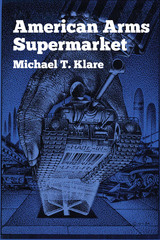
U.S. arms sales to Third World countries rapidly escalated from $250 million per year in the 1950s and 1960s to $10 billion and above in the 1970s and 1980s. But were these military sales, so critical in their impact on Third World nations and on America’s perception of its global role, achieving the ends and benefits attributed to them by U.S. policymakers? In American Arms Supermarket, Michael T. Klare responds to this troubling, still-timely question with a resounding no, showing how a steady growth in arms sales places global security and stability in jeopardy.
Tracing U.S. policies, practices, and experiences in military sales to the Third World from the 1950s to the 1980s, Klare explains how the formation of U.S. foreign policy did not keep pace with its escalating arms sales—how, instead, U.S. arms exports proved to be an unreliable instrument of policy, often producing results that diminished rather than enhanced fundamental American interests. Klare carefully considers the whole spectrum of contemporary American arms policy, focusing on the political economy of military sales, the evolution of U.S. arms export policy from John F. Kennedy to Ronald Reagan, and the institutional framework for arms export decision making. Actual case studies of U.S. arms sales to Latin America, Iran, and the Middle East provide useful data in assessing the effectiveness of arms transfer programs in meeting U.S. foreign policy objectives.
The author also rigorously examines trouble spots in arms policy: the transfer of arms-making technology to Third World arms producers, the relationship between arms transfers and human rights, and the enforcement of arms embargoes on South Africa, Chile, and other “pariah” regimes. Klare also compares the U.S. record on arms transfers to the experiences of other major arms suppliers: the Soviet Union and the “big four” European nations—France, Britain, the former West Germany, and Italy. Concluding with a reasoned, carefully drawn proposal for an alternative arms export policy, Klare vividly demonstrates the need for cautious, restrained, and sensitive policy.
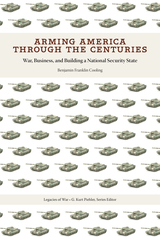
While many associate the concept commonly referred to as the “military-industrial complex” with President Dwight D. Eisenhower’s 1961 farewell address, the roots of it existed two hundred years earlier. This concept, as Benjamin Franklin Cooling writes, was “part of historical lore” as a burgeoning American nation discovered the inextricable relationship between arms and the State. In Arming America through the Centuries, Cooling examines the origins and development of the military-industrial complex (MIC) over the course of American history. He argues that the evolution of America’s military-industrial-business-political experience is the basis for a contemporary American Sparta. Cooling explores the influence of industry on security, the increasing prevalence of outsourcing, ever-present economic and political influence, and the evolving nature of modern warfare. He connects the budding military-industrial relations of the colonial era and Industrial Revolution to their formal interdependence during the Cold War down to the present-day resurrection of Great Power competition. Across eight chronological chapters, Cooling weaves together threads of industry, finance, privatization, appropriations, and technology to create a rich historical tapestry of US national defense in one comprehensive volume.
Integrating information from both recent works as well as canonical, older sources, Cooling’s ambitious single-volume synthesis is a uniquely accessible and illuminating survey not only for scholars and policymakers but for students and general readers as well.
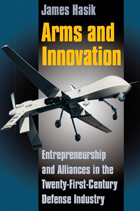
For all their advantages, small firms also face significant challenges in access to capital and customers. To overcome such problems, they can form alliances either with each other or with larger companies. Hasik traces the trade-offs of such alliances and provides crucial insight into their promises and pitfalls.
This ground-breaking study is a significant contribution to understanding both entrepreneurship and alliances, two crucial factors in business generally. It will be of interest to readers in the defense sector as well as the wider business community.
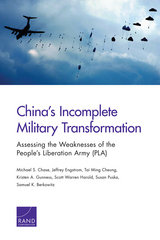

Cornerstone of the Nation is the first historical account of the complex alliance of military and civilian forces that catapulted South Korea’s conjoined militarization and industrialization under Park Chung Hee (1961–1979). Kwon reveals how Park’s secret program to build an independent defense industry spurred a total mobilization of business, science, labor, and citizenry, all of which converged in military-civilian forces that propelled an unprecedented model of modernization in Korea.
Drawing on largely untapped declassified materials from Korea and personal interviews with contemporaneous participants in the nascent defense industry, as well as declassified US documents and other external sources, Kwon weaves together oral histories and documentary evidence in an empirically rich narrative that details how militarization shaped the nation’s rapid economic, technological, political, and social transformation. Cornerstone of the Nation makes the case that South Korea’s arms development under Park may be the most durable and yet least acknowledged factor behind the country’s rise to economic prominence in the late twentieth century. Through an analysis that simultaneously engages some of the most contested issues in Korean historiography, development literature, contemporary politics, and military affairs, this book traces Korea’s distinct pathway to becoming a global economic force.

Based on painstaking research in government archives, collections of private and court papers and documents won by the author in a landmark Freedom of Information Tribunal against the Foreign and Commonwealth Office, the book illuminates a shadow world of bribery and elite enrichment.
Deception in High Places charts British government involvement in arms trade corruption and presents the fullest history yet of bribery in Britain’s arms deals with Saudi Arabia. It includes the backstory of the controversial termination of a Serious Fraud Office corruption investigation following pressure by the Saudi Royal Family and the British establishment.
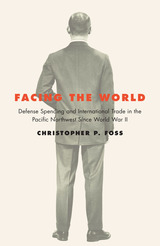
By the dawn of the twenty-first century, the Pacific Northwest boasted a more diversified economy. Beer, tourism, and high tech moved in alongside timber and wheat as the region’s mainstay industries. In Washington, especially, a Cold War–driven military and national security state set up shop as an economic behemoth even as debates over the costs and consequences of the new Atomic Age raged.
Facing the World highlights these changes, as well as the politicians, business leaders, and ordinary people who helped bring them about. At the center of the story, Senators Henry Jackson, Wayne Morse, Slade Gorton, and Mark Hatfield; Congressman Tom Foley; and Governor Vic Atiyeh worked diligently for a generation to transform the region from insular and backward to cosmopolitan and forward-looking. Aligning the region with national security and international trade policies, these politicians made the Pacific Northwest economy what it is today.
Through extensive research in congressional and federal archives, historian Christopher P. Foss vividly brings to life the discussions, conflicts, and controversies that shaped this political era. Though it wasn’t perfect, its fading legacy of leadership is a lesson for our own time. Facing the World will prove a valuable resource to historians, political scientists, and civic-minded residents of the Pacific Northwest.
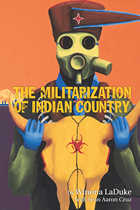
When it became public that Osama bin Laden’s death was announced with the phrase “Geronimo, EKIA!” many Native people, including Geronimo’s descendants, were insulted to discover that the name of a Native patriot was used as a code name for a world-class terrorist. Geronimo descendant Harlyn Geronimo explained, “Obviously to equate Geronimo with Osama bin Laden is an unpardonable slander of Native America and its most famous leader.” The Militarization of Indian Country illuminates the historical context of these negative stereotypes, the long political and economic relationship between the military and Native America, and the environmental and social consequences. This book addresses the impact that the U.S. military has had on Native peoples, lands, and cultures. From the use of Native names to the outright poisoning of Native peoples for testing, the U.S. military’s exploitation of Indian country is unparalleled and ongoing.
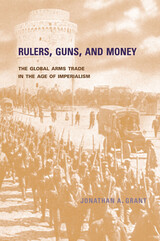
The explosion of the industrial revolution and the rise of imperialism in the second half of the nineteenth century served to dramatically increase the supply and demand for weapons on a global scale. No longer could arms manufacturers in industrialized nations subsist by supplying their own states' arsenals, causing them to seek markets beyond their own borders.
Challenging the traditional view of arms dealers as agents of their own countries, Jonathan Grant asserts that these firms pursued their own economic interests while convincing their homeland governments that weapons sales delivered national prestige and could influence foreign countries. Industrial and banking interests often worked counter to diplomatic interests as arms sales could potentially provide nonindustrial states with the means to resist imperialism or pursue their own imperial ambitions. It was not mere coincidence that the only African country not conquered by Europeans, Ethiopia, purchased weapons from Italy prior to an attempted Italian invasion.
From the rise of Remington and Winchester during the American Civil War, to the German firm Krupp's negotiations with the Russian government, to an intense military modernization contest between Chile and Argentina, Grant vividly chronicles how an arms trade led to an all-out arms race, and ultimately to war.
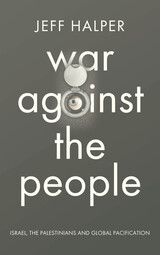
Halper goes on to show how this method of war is rapidly globalizing, as the major capitalist powers and corporations transform militaries, security agencies, and police forces into an effective instrument of global pacification. Simultaneously a deeply researched exposé and a clarion call, War Against the People is a bold attempt to shine the light on the daily injustices visited on a civilian population —and thus hasten their end.
READERS
Browse our collection.
PUBLISHERS
See BiblioVault's publisher services.
STUDENT SERVICES
Files for college accessibility offices.
UChicago Accessibility Resources
home | accessibility | search | about | contact us
BiblioVault ® 2001 - 2024
The University of Chicago Press









